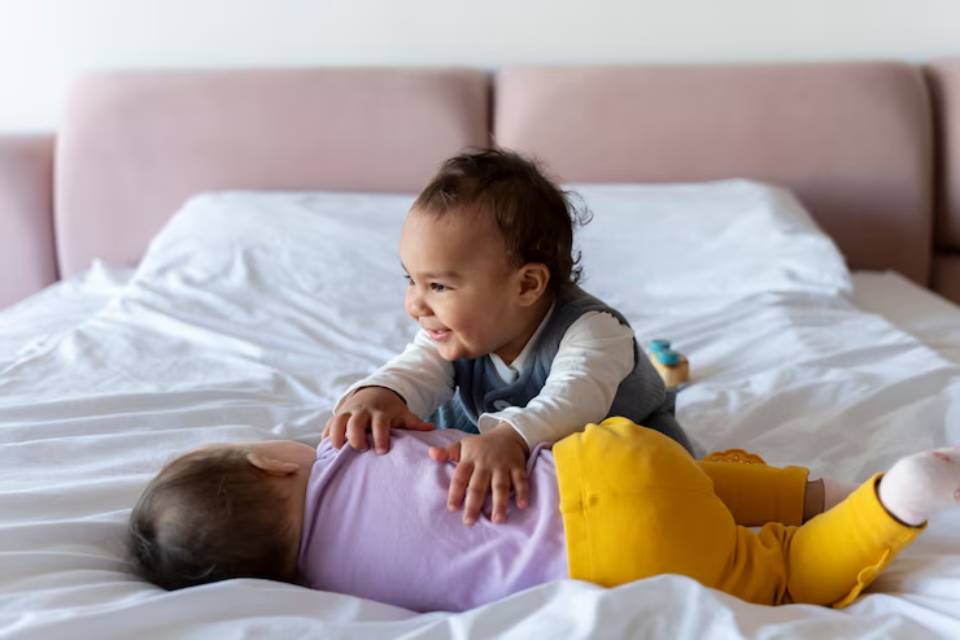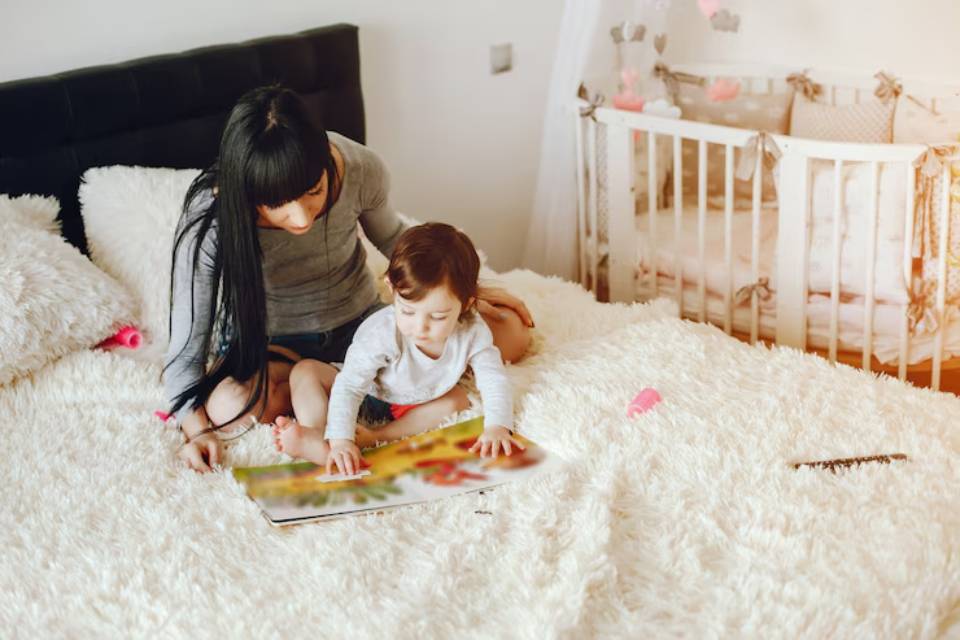
How to Get Siblings to Sleep Through a Newborn’s Noises
Just when you’ve adjusted to life with a newborn, another challenge emerges: your older child’s sleep starts to unravel. The baby cries, the toddler stirs, and suddenly no one is sleeping. If you’re trying to help siblings sleep through a newborn’s night noises, you’re facing a common (and solvable) parenting hurdle.
This guide will show you how to minimise disturbances, create calm sleeping conditions, and ensure that everyone—from your newborn to your older child—can sleep more peacefully, even under one roof.
Understanding the Core: Why Newborn Noises Disrupt Sibling Sleep

Newborns are naturally noisy sleepers. They grunt, snuffle, and cry during active sleep. This is part of their light REM cycles and undeveloped circadian rhythms. Unfortunately, for siblings who sleep nearby—or share a room—these sounds can mean frequent night wakings.
According to the Sleep Foundation, children over the age of two typically need 10–12 hours of uninterrupted sleep. Disruptions caused by a newborn’s crying can lead to crankiness, night-time anxiety, and bedtime resistance in older kids.
Important Note: Shared sleeping arrangements (like siblings in the same room) can work well—but only with preparation, structure, and boundaries.
Quick Guide: Helping Siblings Sleep Through a Newborn’s Noise
- Create physical and auditory sleep separation (room dividers, white noise)
- Establish a consistent bedtime routine for the older child
- Avoid sudden changes to your older child’s routine post-baby
- Teach expectations about baby noises in advance
- Offer a comfort item or reassurance for disrupted nights
- Reinforce daytime connection to prevent jealousy at bedtime
- Keep the baby as quiet and dimly lit as possible during night feeds
Step-by-Step Guide: Strategies That Work for Both Children
Step 1: Assess Your Sleeping Arrangements

- If space allows, separate sleeping rooms—even temporarily
- If sharing a room, create distinct zones with curtains, shelves, or furniture
- Consider positioning the baby closer to your bed rather than the sibling’s
Pro Tip: Use a white noise machine near the sibling’s bed—not the baby’s—to mask nighttime grunts and cries.
Step 2: Maintain a Predictable Bedtime Routine for the Older Child
- Stick to their familiar rhythm: bath, pyjamas, storytime, lights out
- Avoid delaying their bedtime or skipping steps because of the baby
- This helps anchor their sleep and offers a sense of control
Step 3: Introduce Baby Sounds Gradually
- Play a recording of gentle baby noises during naps to acclimate your child
- Explain what to expect: “The baby might cry at night, but you’re safe and can keep sleeping.”
Important Tip: Avoid making the baby a “problem” in conversations—frame the situation as part of the new family team dynamic.
Step 4: Offer Comfort Tools
- A soft nightlight, cuddly toy, or special bedtime music can provide comfort
- For children over 3, consider a reward chart for staying in bed through the night
Step 5: Handle Night Wakings Calmly
- If your older child wakes due to the baby’s noise, keep your response brief and reassuring
- Avoid overreacting or giving extra attention that reinforces waking up
Pro Tip: Prepare a short script, like “It’s still night-time. The baby’s just noisy sometimes, but you’re okay.”
Step 6: Minimise Baby Disruption
- Use dim lighting and whisper-level voices during baby night feeds
- If possible, feed in another room to avoid stirring the older child
If the baby frequently cries or struggles to settle, consider adjusting their routine. You’ll find practical tips in our guide on how to help your baby sleep longer at night.
Best Practices & Additional Insights
Newborns often become noisier before they sleep more soundly. The first few weeks are an adjustment period, not just for the baby but for the entire family.
Amira, a mum of three from Leeds, shared: “We moved the cot to the far side of the room and gave our toddler a nightlight and white noise. He slept better by night three—and we finally exhaled.”
Try not to over-focus on perfection. Some disruptions will happen. What matters is how you respond—with calm consistency and realistic expectations.
If your baby is still relying on sleep crutches like rocking or feeding to fall asleep, our guide to transitioning from rocking to independent sleep can help reduce nighttime fussiness.
Frequently Asked Questions
1. Will my older child eventually get used to baby noise?
Yes. Most children adapt within a week or two, especially with white noise and consistent routines.
2. Should siblings share a room right away?
Not necessarily. It’s fine to delay room sharing until the baby sleeps longer stretches.
3. What if my toddler regresses after the baby arrives?
Mild regressions are normal. Stay consistent, give daytime attention, and avoid over-compensating at bedtime.
4. Is it okay to reward my child for sleeping through baby noise?
Yes, especially if they’re over three. Small rewards or praise can reinforce the desired behaviour.
5. How can I stop bedtime jealousy between siblings?
Involve the older child in baby routines during the day, and protect their own bedtime as special one-on-one time.
A Restful Home Is Within Reach

Managing sibling sleep when you have a newborn doesn’t require silence—it requires strategy. With preparation, empathy, and a few simple tools, you can help your older child sleep soundly even when your baby isn’t.
Consistency is key. Keep routines strong, communication open, and expectations clear. It may take a few nights, but peaceful sleep for all your little ones is possible.
Start tonight with one simple change—and let rest return to your home.


